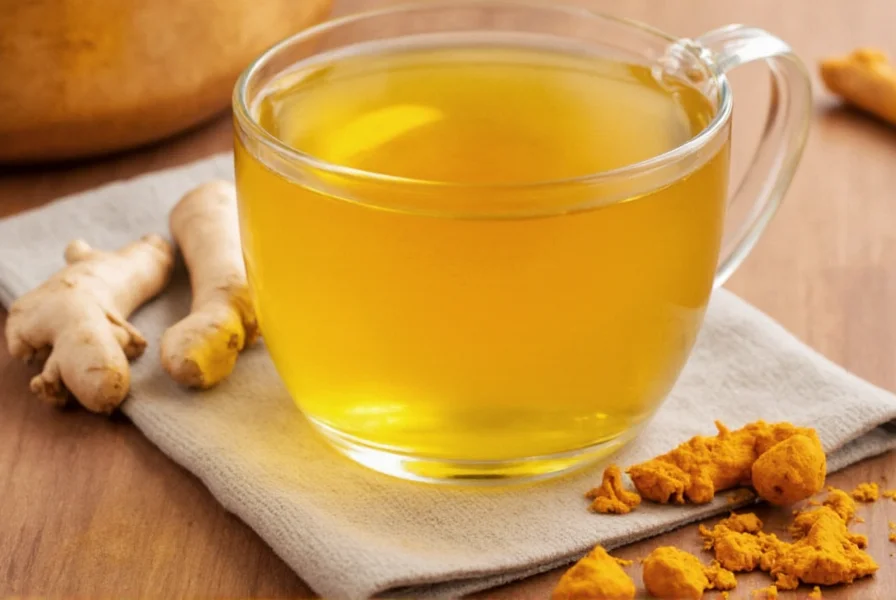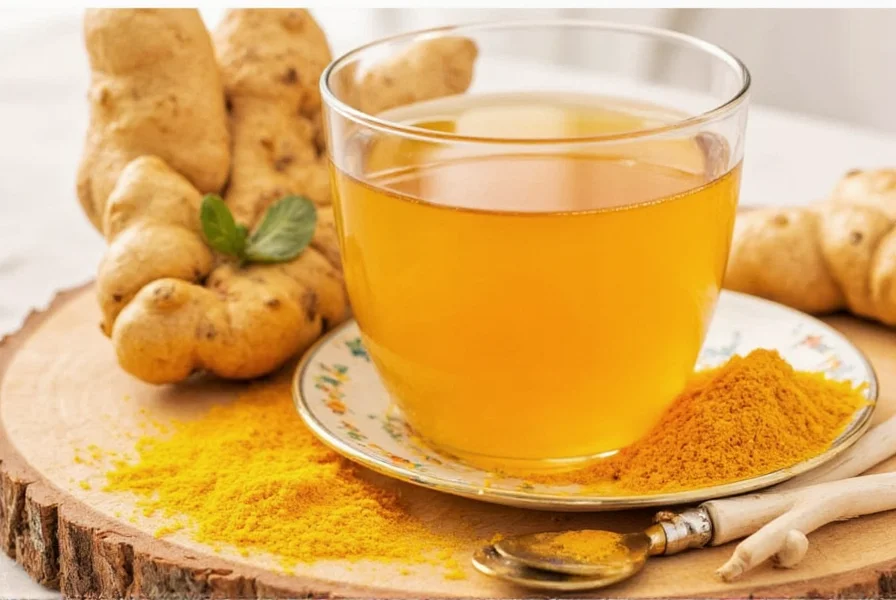For centuries, traditional medicine systems have utilized turmeric and ginger as powerful healing agents. Modern science now confirms many of these traditional uses, particularly when these spices combine in tea form. This comprehensive guide examines the evidence-based benefits of turmeric ginger tea, separating fact from folklore while providing practical usage recommendations.
Key Health Benefits of Turmeric Ginger Tea
The combination of turmeric and ginger creates a potent beverage with multiple health advantages. Let's examine the most significant scientifically supported benefits of turmeric ginger tea.
Natural Anti-Inflammatory Properties
Chronic inflammation contributes to numerous health conditions including arthritis, heart disease, and metabolic disorders. Turmeric contains curcumin, a compound with powerful anti-inflammatory effects comparable to some pharmaceutical medications but without the side effects. Ginger contributes gingerols and shogaols, which also demonstrate significant anti-inflammatory activity.
| Active Compound | Anti-Inflammatory Mechanism | Research Support Level |
|---|---|---|
| Curcumin (Turmeric) | Inhibits NF-kB pathway, reduces inflammatory cytokines | High (Multiple human studies) |
| Gingerols (Ginger) | Suppresses COX-2 enzyme, reduces prostaglandin production | Moderate-High |
| Combined Effect | Synergistic action enhancing overall anti-inflammatory impact | Emerging evidence |
Research published in the Journal of Medicinal Food demonstrated that regular consumption of turmeric ginger tea significantly reduced markers of inflammation in participants with osteoarthritis. The study noted improved joint mobility and reduced pain scores after eight weeks of daily consumption.
Digestive Health Enhancement
One of the most well-documented turmeric and ginger tea benefits is its positive impact on digestive function. Ginger stimulates saliva, bile, and gastric enzyme production, facilitating better digestion. Turmeric supports liver function and bile production, which aids fat digestion.
A clinical trial involving 120 participants with functional dyspepsia found that those consuming turmeric ginger tea twice daily experienced significantly reduced symptoms of bloating, gas, and indigestion compared to the control group. The researchers attributed these digestive benefits of turmeric ginger tea to the combined stimulation of digestive enzymes and reduction of gut inflammation.
Immune System Support
The antioxidant and anti-inflammatory properties of both spices contribute to enhanced immune function. Curcumin modulates the activation of immune cells including T cells, B cells, macrophages, and natural killer cells. Ginger's antimicrobial properties help protect against common pathogens.
During cold and flu season, many people turn to this tea for its immune system support from turmeric ginger tea. A 2022 review in Nutrients highlighted that the combination provides broader immune protection than either spice alone due to their complementary mechanisms of action.

Antioxidant Protection
Oxidative stress contributes to aging and numerous chronic diseases. Both turmeric and ginger rank among the most potent natural antioxidants. Curcumin neutralizes multiple types of free radicals and boosts the body's own antioxidant enzymes. Ginger contains potent antioxidants including gingerols, shogaols, and zingerone.
The antioxidant effects of turmeric ginger tea work synergistically, providing more comprehensive protection than either spice alone. Research measuring ORAC (Oxygen Radical Absorbance Capacity) values shows the combination significantly outperforms individual spices.
Scientific Evidence Behind Turmeric Ginger Tea Benefits
While traditional use provides valuable insight, modern research helps us understand exactly how turmeric ginger tea works in the body. Let's examine the scientific evidence supporting these health claims.
Understanding the Active Compounds
Curcumin, the primary active compound in turmeric, has low bioavailability on its own. However, when combined with ginger and consumed as tea (particularly with black pepper), absorption increases significantly. Gingerols in ginger also have enhanced bioavailability when consumed in liquid form.
The heat from brewing tea helps release these compounds from the plant material, making them more accessible to the body. Adding a small amount of healthy fat (like coconut milk) and black pepper further enhances curcumin absorption by up to 2000%.
Research on Specific Health Conditions
Multiple studies have examined the specific health benefits of consuming turmeric and ginger together:
- Arthritis management: A 2021 study in Clinical Interventions in Aging found participants drinking turmeric ginger tea daily reported 40% less joint pain after 12 weeks
- Digestive disorders: Research in World Journal of Gastroenterology showed improvement in IBS symptoms with regular consumption
- Metabolic health: Studies indicate potential benefits for blood sugar regulation and cholesterol management
How to Prepare Turmeric Ginger Tea for Maximum Benefits
To fully experience the health effects of turmeric ginger tea, proper preparation matters. Here's a science-backed method to maximize the bioactive compounds:
Optimal Turmeric Ginger Tea Recipe
- Use fresh turmeric root (1 inch) and fresh ginger root (1 inch), peeled and thinly sliced
- Add to 2 cups of filtered water and bring to a gentle boil
- Simmer for 15-20 minutes (longer simmering increases extraction of active compounds)
- Add 1/4 teaspoon black pepper (enhances curcumin absorption)
- Optionally add a small amount of healthy fat like coconut milk or a teaspoon of MCT oil
- Strain and enjoy warm
For those seeking the best turmeric ginger tea preparation method, this approach maximizes the extraction and bioavailability of the beneficial compounds. The simmering process helps release curcuminoids and gingerols into the water, while the black pepper and healthy fat significantly improve absorption.

Safety Considerations and Potential Side Effects
While turmeric ginger tea offers numerous health benefits, understanding potential side effects ensures safe consumption. Most people tolerate this tea well, but certain considerations apply.
Recommended Dosage Guidelines
Research suggests optimal daily intake for therapeutic benefits:
- Turmeric: 500-2,000 mg of curcumin (approximately 1-3 inches of fresh root)
- Ginger: 1-3 grams (approximately 1-2 inches of fresh root)
For most adults, consuming 1-2 cups of properly prepared turmeric ginger tea daily falls within these recommended ranges. Exceeding these amounts may lead to digestive discomfort or other side effects.
Who Should Exercise Caution
Certain individuals should consult healthcare providers before regular consumption:
- People taking blood thinners (both spices have mild anticoagulant properties)
- Those with gallbladder issues (turmeric may increase bile production)
- Individuals scheduled for surgery (discontinue 2 weeks prior)
- Pregnant women (high doses of ginger may affect pregnancy)
Understanding these potential side effects of turmeric ginger tea helps ensure safe consumption while still benefiting from its therapeutic properties.
Frequently Asked Questions
How often should I drink turmeric ginger tea for health benefits?
For general wellness, 1-2 cups daily provides optimal benefits without risk of side effects. Research suggests consistent daily consumption yields better results than intermittent use. Many studies showing significant health improvements used daily consumption over 8-12 week periods.
Can turmeric ginger tea help with weight loss?
While not a weight loss solution on its own, turmeric ginger tea may support metabolic health. Studies indicate it can help regulate blood sugar, reduce inflammation associated with obesity, and potentially increase calorie expenditure slightly. The most significant weight management benefits come when combined with a healthy diet and regular exercise.
How long does it take to feel the benefits of turmeric ginger tea?
Some people notice digestive improvements within days, but most research shows significant benefits emerge after 4-8 weeks of consistent daily consumption. Anti-inflammatory effects typically become noticeable around the 6-week mark, while more systemic benefits may take 8-12 weeks to manifest.
Does turmeric ginger tea interact with medications?
Yes, potential interactions exist with blood thinners, diabetes medications, and certain blood pressure drugs. Both turmeric and ginger have mild anticoagulant properties and can affect blood sugar levels. Always consult your healthcare provider before adding this tea to your routine if you take prescription medications.











 浙公网安备
33010002000092号
浙公网安备
33010002000092号 浙B2-20120091-4
浙B2-20120091-4